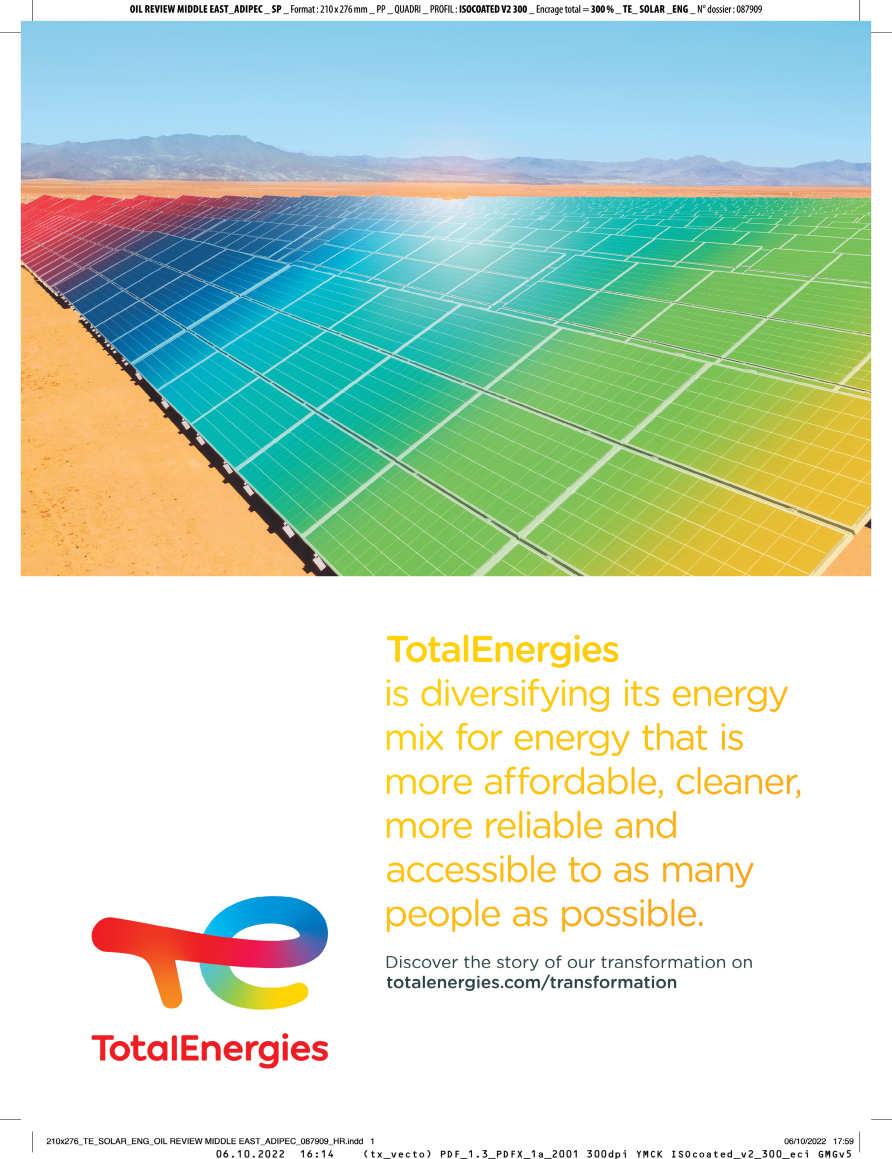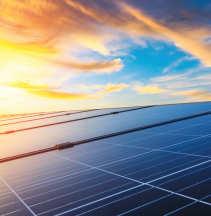
20 minute read
Developments
Growth in fossil fuel emissions slowing - IEA
THE GROWTH OF renewables and electric vehicles is holding down global CO2 emissions from fossil fuels in 2022, according to the latest research from the International Energy Agency (IEA).
Despite concerns about the effects of the current energy crisis, global carbon dioxide (CO2) emissions from fossil fuel combustion are expected to grow by just under 1% this year, only a small fraction of their increase last year, as a strong expansion of The growth of renewables and EVs is holding renewables and electric vehicles prevent a down CO2 emissions. much sharper rise.
New IEA analysis of the latest data shows that these CO2 emissions are on course to increase by close to 300mn tonnes in 2022 to 33.8bn tonnes – a far smaller rise than their jump of nearly 2bn tonnes in 2021, which resulted from the rapid global recovery from the economic crisis triggered by the pandemic. This year’s increase is driven by power generation and by the aviation sector, as air travel rebounds from pandemic lows.
Even though the energy crisis sparked by Russia’s invasion of Ukraine has propped up global coal demand in 2022 by making natural gas far more expensive, the relatively small increase in coal emissions has been considerably outweighed by the expansion of renewables. Global energy trends have also been affected this year by the impacts of Russia’s war on the world economy, which have significantly dampened expectations for economic growth, notably in Europe.
The combined result is that the CO2 intensity of the world’s energy supply is set to improve slightly in 2022, resuming a years-long trend of consistent improvement that was disrupted last year by the emissions-intensive economic recovery from the Covid crisis.
“The global energy crisis triggered by Russia’s invasion of Ukraine has prompted a scramble by many countries to use other energy sources to replace the natural gas supplies that Russia has withheld from the market. The encouraging news is that solar and wind are filling much of the gap, with the uptick in coal appearing to be relatively small and temporary,” said IEA executive director Fatih Birol. “This means that CO2 emissions are growing far less quickly this year than some people feared – and that policy actions by governments are driving real structural changes in the energy economy. Those changes are set to accelerate, thanks to the major clean energy policy plans that have advanced around the world in recent months.”
Solar PV and wind are leading an increase in global renewable electricity generation in 2022 of more than 700 terawatt-hours (TWh), the largest annual rise on record. Without this increase, global CO2 emissions would be more than 600mn tonnes higher this year. The rapid deployment of solar and wind is on course to account for two-thirds of the growth in renewable power generation. Despite the challenging situation that hydropower has faced in several regions due to droughts this year, global hydropower output is up year-on-year, contributing over one-fifth of the expected growth in renewable power.
While electricity generation from both wind and solar PV is growing far more than any other source in 2022, coal is expected to post the next largest increase as some countries revert to coal use in response to soaring natural gas prices. In total, global CO2 emissions from coalfired power generation are set to grow by more than 200mn tonnes, or 2%, this year, led by increases in Asia.
As well as the challenges for hydropower in some regions, the world’s low-emissions electricity supply has suffered a setback from a series of nuclear power plant outages, which are set to reduce global nuclear power production by over 80 TWh. This has largely been due to more than half of France’s fleet of nuclear reactors being offline for part of the year. The drop in nuclear power generation globally has contributed to an increased use of coal and oil for electricity generation. The world’s use of natural gas is expected to decline following Russia’s invasion of Ukraine, resulting in a decrease in CO2 emissions of around 40mn tonnes in 2022.
Demand for oil is set to grow more than for any other fossil fuel in 2022, with oil-related CO2 emissions up by around 180mn tonnes. This has been driven largely by the transport sector as travel restrictions have been lifted and pre-pandemic commuting and travel patterns have resumed. Aviation is expected to contribute around three-quarters of the rise in emissions from oil use, notably due to increases in international air travel. However, the aviation sector’s emissions are still only around 80% of their pre-pandemic levels.
Uncertainty in global natural gas markets will continue to shape many key energy trends for the rest of this year and in 2023, says the IEA. However, promising signs of lasting structural changes to the CO2 intensity of global energy are evident in 2022 – and they are set to be reinforced by major increases in government support for clean energy investment.

Image credit: Adobe Stock
Qatar inaugurates its first solar PV power plant
HIS HIGHNESS SHEIKH Tamim bin Hamad Al Thani, Amir of the State of Qatar, has inaugurated the Al-Kharsaah Solar PV Power Plant (KSPP), the first in Qatar and one of the largest in the region, with a total capacity of 800 MW.
The KSPP is the first solar PV plant in Qatar.
Image credit: Adobe Stock
The power plant has been developed and is operated by Siraj 1, which is jointly owned 40% by the Consortium formed by TotalEnergies (49%) and Marubeni (51%) and 60% by QatarEnergy Renewable Solutions. The project includes a 25-year Power Purchase Agreement between Siraj 1 and the power grid operator Kahramaa.
Located 80 km West of Doha, the plant was constructed over 10 sq km terrain. It can supply 10% of the country's peak power consumption and will avoid 26 million tons of CO2 emissions during its lifetime.
“After our recent entry in the giant LNG projects NFE and NFS alongside QatarEnergy, we are proud to announce today the start-up of the Al Kharsaah solar plant. This giant project, which contributed to the sustainability roadmap of Qatar, demonstrates once again TotalEnergies' ability to support producing countries in their energy transition by combining natural gas production and solar energy to meet the growing demand for electricity,” said Patrick Pouyanné, chairman and chief executive officer of TotalEnergies.
The inauguration follows QatarEnergy's recent announcement of a new solarisation project for the Ras Laffan and Mesaieed industrial cities, with the support of TotalEnergies. With 900 MWp of installed capacity, this project will be a second major milestone in QatarEnergy's strategy to reduce the carbon footprint of its facilities by 2030 and to develop 5 GW of renewable power generation capacity by 2035.

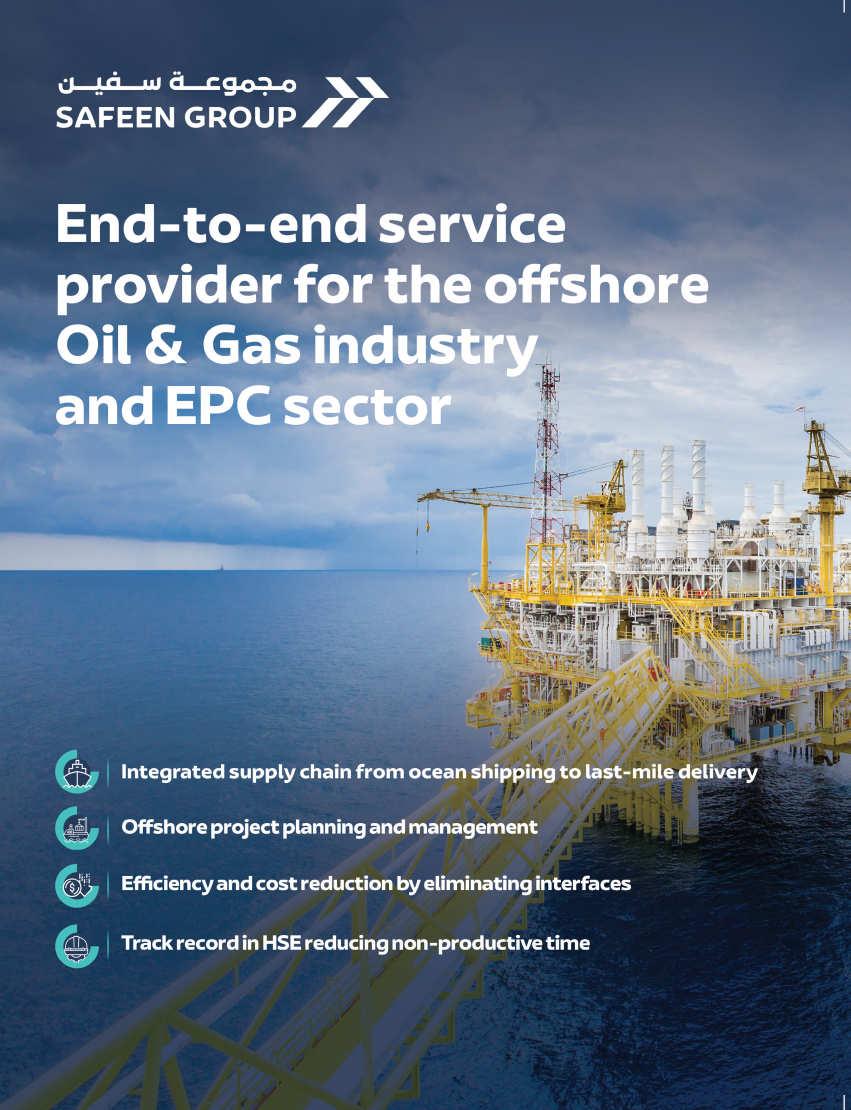
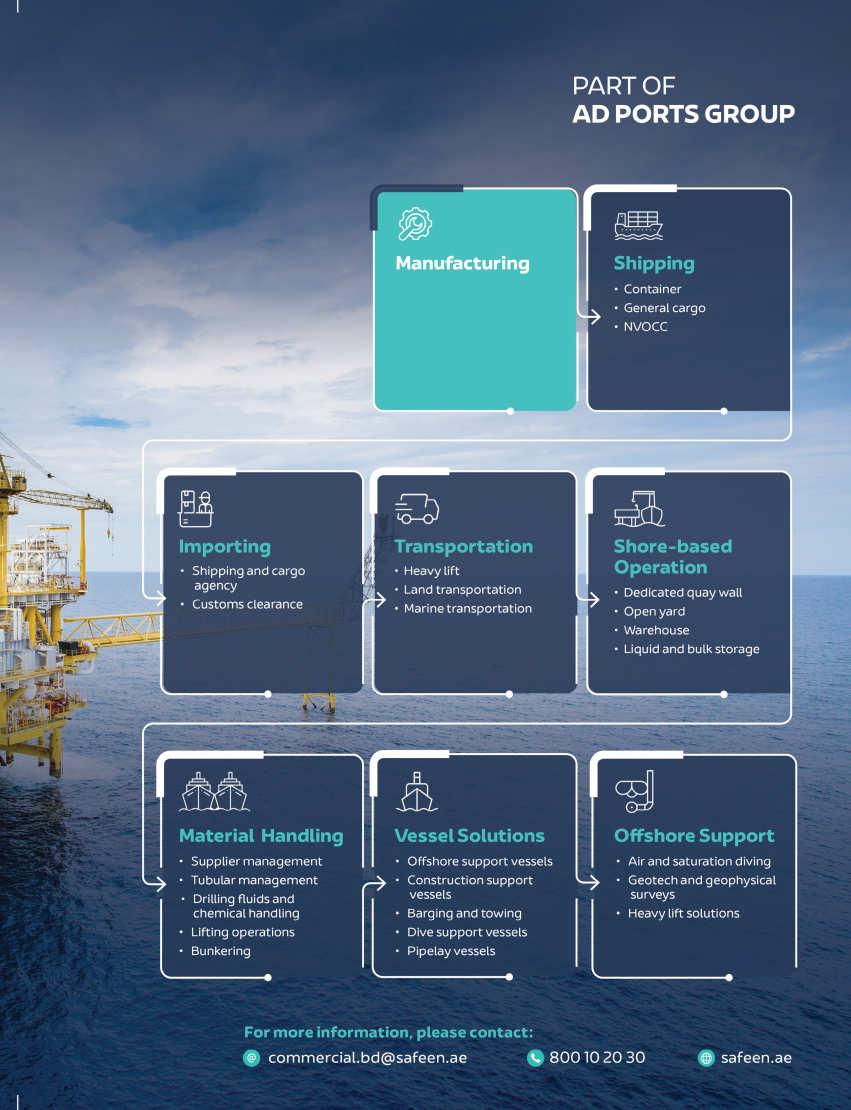
Energy crisis boosting momentum for hydrogen development - IEA
MOMENTUM CONTINUES TO build behind lowemissions hydrogen amid the global energy crisis, according to the International Energy Agency’s (IEA) annual Global Hydrogen Review.
If all projects currently in the pipeline come to fruition, the production of low-emissions hydrogen globally could reach somewhere in the range of 16mn to 24mn tonnes per year by 2030 – up from just 1mn tonnes in 2021 – with more than half of it coming from electrolysers running on renewable energy, the report finds. And promising pilot projects are proliferating for new applications of hydrogen in areas such as shipping and steel.
However, these promising uses for hydrogen remain relatively small within the wider hydrogen landscape and there is a need for greater policy support to help them grow. The majority of the hydrogen in use today is produced from fossil fuels without any technologies to capture the resulting CO2 emissions. The report stresses that governments need to support development projects, but also take steps to reassure investors that there will be future demand for hydrogen.
The report indicated that the encouraging developments in hydrogen technologies that can support the clean energy transition include an expected sixfold increase by 2025 in global manufacturing capacity of electrolysers, which are needed to produce low-emissions hydrogen from renewable electricity.
Meanwhile, overall hydrogen demand worldwide reached 94mn tonnes in 2021, exceeding the previous annual high of 91mn tonnes reached in 2019. Almost all of the increase last year was met by hydrogen produced from fossil fuels without carbon capture. And while demand for new applications of hydrogen jumped by 60% in 2021, the growth was from such a low base that it rose to just 40,000 tons.
With the global energy crisis boosting interest in low-emissions hydrogen, the pipeline of projects keeps expanding, although only a small share of the projects are under construction. The Global Hydrogen Review lays out a series of policy recommendations to build the frameworks and create the demand needed to encourage investment in low-emissions hydrogen, including in the electrolysers and carbon capture technologies needed to produce it.
Taking into account today’s policy settings by governments, the new report estimates that global hydrogen demand is set to reach 115mn tonnes by 2030. If governments fully deliver on their current climate pledges, that number could rise to 130mn tonnes, with more than a quarter of it being met by low-emissions hydrogen. A similar amount of global hydrogen demand would be for new applications in that scenario.
The report suggests that based on today’s prices, renewable hydrogen could already compete with hydrogen from fossil fuels in regions that have good renewable resources and that currently rely on imported fossil fuels for hydrogen production.
Today, global capacity to manufacture electrolysers stands at 8GW a year, but based on industry announcements it could exceed 60GW a year by 2030. If electrolyser projects in the pipeline are completed and the planned scaling up in manufacturing capacities takes place, costs could fall by around 70% by 2030.
IEA executive director, Fatih Birol, commented, “There are growing signs that hydrogen will be an important element of the transition to an affordable, secure and clean energy system, but there are still major advances in technology, regulation and demand needed for it to fulfil its potential. The strong flow of announcements we now see for low-emissions hydrogen projects are yet another indicator that a new energy economy is emerging. Governments now need to implement concrete policies to remove regulatory barriers and support shovel-ready projects.”
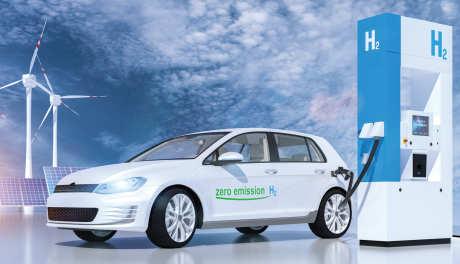
Momentum continues to build for hydrogen development.

ADNOC to hire two jack-up offshore rigs
Uncertainty prevails over TurkeyLibya exploration deal
ABU DHABI NATIONAL Oil Company (ADNOC) has awarded a contract worth US$980mn to ADNOC Drilling to hire two jack-up offshore rigs and associated manpower and equipment. The contract, awarded by ADNOC Offshore, will support the expansion of The contract is worth US$980mn. ADNOC’s production capacity as it responds to the growing global demand for lower carbon intensity oil and gas.
More than 80% of the award value will flow back into the UAE’s economy under ADNOC’s In-Country Value (ICV) programme, supporting local economic growth and diversification.
Yaser Saeed Almazrouei, ADNOC upstream executive director, said, “This award supports our ongoing efforts to responsibly unlock our lower carbon intensity oil and gas resources, alongside our strategic international partners, and contribute to global energy security. ADNOC Drilling’s world-class capabilities continue to be a key enabler of these efforts. Importantly, this award will also deliver significant in-country value to drive economic growth and diversification, in line with the UAE leadership’s wise directives.”
Image Credit: Adobe Stock
RECEP TAYYIP ERDOGAN, the President of Turkey, has signed a memorandum of understanding with Abdul Hamid Dbeibah, Prime Minister of the Tripoli-based Government of National Unity to explore the latter’s oil and gas resources.
The deal also includes a provision whereby Libya’s state-owned National Oil Corporation will allow Turkish upstream company Turkiye Petrolleri Anonim Ortakligi to participate in onshore and offshore projects in the North African country.
The agreement, however, stands on edge as the Tobruk-based House of Representatives refuses to recognise its validity. “Dbeibah has no right to sign deals with foreign powers,” said Fathi Bashagha, who heads the Government of National Stability, appointed by the House of Representatives.
According to analysts, the current crude production of Libya stands at a recovered rate of around 1.1-1.2mn bpd.
North Field South project to take in more partners
SAAD SHERIDA AL-KAABI, the Minister of State for Energy Affairs, and president and CEO of QatarEnergy, revealed that three new partners will be entering the North Field South (NFS) project in addition to TotalEnergies, adding that they will be announced in Saad Sherida Al-Kaabi, the due course. He made the remarks during Minister of State for Energy the Energy Intelligence Forum’s Energy Affairs, and president and Executive of the Year Leadership CEO of QatarEnergy. (Right) Dialogue in London.
Al-Kaabi noted that the North Field East, North Field South, and Golden Pass projects will bring a total of 48mn tons of LNG per annum, stressing that Qatar alone will bring most of the new LNG volumes between 2025 and 2027.
Image Credit: QatarEnergy
KROHNE Group certified for IT security
KROHNE GROUP, A leading global manufacturer and full scope supplier of process instrumentation, measurement solutions and services, has achieved the international standard in the field of IT security, IEC 62443-4-1 maturity level 2. This demonstrates KROHNE’s continued focus on satisfying international criteria for safe and reliable IT infrastructure, expanding the boundaries of the company’s management certification systems including ISO9001, ISO14001, ISO45001 amongst a growing catalogue. The security certification audit was carried out in conjunction with TUV Rhineland and is expected to fill existing and future customers with confidence in KROHNE’s capabilities with regard to secure development in industrial automation.
“This certification is the latest addition to a growing library of international standards we are adopting and complying with in order to allow our customers the freedom to choose the very best industrial automation solutions. We look forward to engaging with more customers looking for future-proofed, platform-agnostic solutions across all industries,” said Frank Janssens, vice president, KROHNE Middle East and Africa.
Image credit: KROHNE Group
Frank Janssens, vice president, KROHNE Middle East and Africa.
EXPRO, A LEADING provider of energy services, has been awarded funding for two carbon reduction projects as part of an innovation programme to accelerate clean energy production and close the gap in net zero technologies.
The Aberdeen-based Net Zero Technology Centre (NZTC) has awarded a total of £8mn (US$9mn) to fund net zero technologies as part of their 2022 Open Innovation Program. The 20 winning technologies fall into seven focus areas. The technologies faced a rigorous selection process, ensuring each supports the transition towards net zero, with an obligation of trialling and deploying the technology within the UK Continental Shelf.
Expro secured both projects awarded in the Venting and Flaring category. They focus on real-time flare emissions measurement and control; and a unique technological solution to enable well testing to be conducted without the need for flaring. Both projects build on the company’s existing capabilities to promote more measured and efficient means of flaring, and to offer alternatives to traditional flaring, in support of operators’ carbon-reducing commitments.
The NZTC believes the 20 successful technology projects will deliver £7.8bn (US$8.7bn) Gross Value Added along with an impact of 3.1Mt CO2e annually.
Expro’s chief technology officer Steve Russell said, “We are delighted to receive the recognition and funding in this programme to help further develop these technological solutions that will play a part in accelerating the industry’s journey to net zero.
“Technology is a critical component in energy transition progression, as are collaboration and partnership to achieve our collective goals. We are committed to addressing our own and the industry’s effects on the planet, and this includes working with clients around the world to
Image credit: Adobe Stock develop and implement solutions to reduce emissions from non-essential flaring.” In the Middle East, Expro recently supported a customer to reduce gas flaring and optimise production at 10 production sites. Expro undertook a detailed study to find an economic alternative to flaring. The solution was to use gas to power compressors, which were delivered, installed, and commissioned within 32 weeks. The fasttrack project was estimated to reduce Expro has been greenhouse gas (GHG) emissions by up to awarded funding for 10,000 tonnes of CO2e per day. Using the projects relating to compressors also reduced operational venting and flaring. expenditure while optimising production and extending field life.
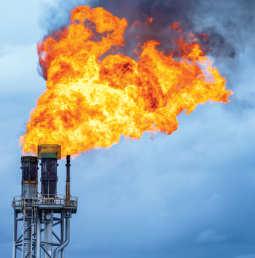
MoU to enhance cyber security
THE ABU DHABI Department of Energy (DoE) has signed a Memorandum of Understanding (MoU) with the Cyber Security Council, aimed at enhancing the security of the UAE’s energy sector. The MoU aims to align the efforts of the DoE and the Cyber Security Council as they develop and disseminate innovative technologies that enhance the digital and cyber security capabilities of the energy sector in Abu Dhabi. Both parties will exchange expertise and data in fields related to information and communication technologies, cyber security risks, electronic espionage, hacking, cyberterrorism, and disinformation campaigns, among others, which are increasing in pace with the accelerated adoption of modern technologies.
The signing of the MoU.
Image credit; Abu Dhabi Department of Energy
Both parties are committed to cooperating and implementing cyber security standards in the energy sector in Abu Dhabi, in addition to developing national capabilities to deter and prevent cyber-attacks and provide immediate response when a government facility is exposed to such attacks or hacking attempts.
The MoU includes information sharing about the spread of malware and promising solutions in the field of information security, as well as participation in awareness building, educational programmes and scientific research.
His Excellency Eng. Ahmed Mohammed Al Rumaithi, Undersecretary of the Department of Energy in Abu Dhabi, said, “Information and communication technology is one of the key pillars of social and economic development in any country. However, with the acceleration of technological developments, digital attacks are becoming more diversified and vicious, posing serious threats to individuals and institutions. Therefore, we must work to ward off these risks in the digital space, and protect all sectors and industries, including the energy sector.”

Oxford Flow partners with KKI
Partnership launched for NAS technology
OXFORD FLOW, A flow control solutions specialist, and KOSO Kent Introl (KKI), part of Nihon Koso group, have entered into a strategic global partnership. The relationship will combine Oxford Flow’s innovative valve technology with KKI’s industry knowledge and valve heritage.
The partnership provides valve users across the global energy landscape access to industry-leading solutions that will not only support their journey towards more reliable, leak-free operations, but also future proof systems, with the drive to increase the use of alternative fuels.
Oxford Flow has engineered a portfolio of valves with only one moving part, to eliminate waste from valves for oil and gas, gas transmission and distribution, water and other industrial process applications.
Neil Poxon, Oxford Flow CEO, said, “We’re delighted to have partnered with KOSO Kent Introl – and this truly is a unique partnership that will disrupt the valve market towards a more sustainable future. Combining our hydrogen-ready gas regulators and emissions-eliminating axial valve with KKI’s industry knowledge, valve heritage and manufacturing expertise offers a very exciting prospect for both companies.”
Image credit: Oxford Flow Neil Poxon, CEO Oxford Flow.
SCHLUMBERGER HAS ENTERED into an agreement with RTI International, a nonprofit research institute, to accelerate the industrialisation and scale-up of its proprietary nonaqueous solvent (NAS) technology, which enhances the efficiency of absorption-based carbon capture. The NAS technology will be applicable to capture CO2 across a broad variety of industrial emissions.
“With the world’s carbon budget running out, reducing emissions is a societal imperative,” said Gavin Rennick, president of Schlumberger’s New Energy business. “Carbon capture technologies are a key enabler in realising a low carbon future – and we are excited about this exclusive agreement to work with RTI on industrialising and scaling this innovative carbon absorption technology, and bringing it to market.”
The NAS technology offers a cost-effective alternative to conventional aqueous solvent technologies for carbon capture, as it consumes less energy while retaining high CO2 capacity. The NAS technology is also less corrosive, eliminating the need for high-grade corrosion-resistant alloys and the associated increase in capital costs.
AMPO POYAM VALVES opens new facility in Saudi Arabia
AMPO POYAM VALVES, a world leader in highly engineered valves, has celebrated the official opening ceremony of its new valve manufacturing and servicing plant, AMPO ARABIA, in Dammam 2nd Industrial City.
The manufacturing and servicing facility will be an extension of the main valve manufacturing plant in Spain and will include valve assembly, testing, painting and servicing facilities. The company intends to transfer global top-tier technology and know-how to the Saudi market, helping expand national industry capacity and enabling economic growth and development in the region, in line with Saudi The ribbon-cutting ceremony. Arabia’s Vision 2030 and In-Kingdom Total Value Add (IKTVA). The facility will positively impact local delivery lead times and aftersales services to meet demands of current and future projects.
Ibon Imaz, AMPO’s managing director, said, “We want to be a strategic partner and we share the Kingdom of Saudi Arabia’s Vision 2030, an important country project. AMPO Arabia is just a start, and will be followed by further business opportunities and investments that can add higher value to the Saudi thriving economy.” He added, “However, we are not new in Saudi Arabia. AMPO POYAM VALVES has been collaborating with the country customers since 1998, supplying more than 20,000 valves for strategic projects in KSA, such as Jubail, Yanbu, Ras Tanura, Rabigh, Khursaniyah, Marjan Field Expansion, Berri Field Development and Abqaia project.”

Image credit: AMPO POYAM VALVES
NNPC opens new yard
NATIONAL PETROLEUM CONSTRUCTION Company (NPCC), a subsidiary of National Marine Dredging Company, has hosted a groundbreaking ceremony for a new 400,000 sq. m fabrication yard in Ras Al Khair port, Saudi Arabia’s newest industrial port, located in the Eastern Province of Saudi Arabia. The ceremony was attended by senior representatives from NMDC Group, Saudi Aramco and Saudi Ports Authority Mawani.
The new yard, which will house the fabrication of jackets and platforms, is a state-of-the-art facility that will include automated workshops and an advanced marine system. It will provide fabrication, maintenance, rigging and erection services, and will be operational between all three phases of construction.
The first phase will be completed by the end of the third quarter of 2023. The capacity of the fabrication yard is expected to reach 60,000 tons per year by the end of the final phase, scheduled for 2026.
The project is in line with the company’s commitment to supporting the Kingdom’s localisation efforts and creating in-country value.
Eng. Yasser Zaghloul, the group chief executive officer at National Marine Dredging Group, said, “The new fabrication yard builds on our longstanding relationship, ongoing growth journey and expansion strategy in the Kingdom and complements our current projects in Saudi Arabia, which will add to our local competencies. We look forward to further broadening our level of collaboration with Saudi industry players and solidifying our position as the EPC major of choice for global NOCs.”
NNPC has worked on major projects including the extension works for a new condensate export terminal at the Jafurah field, and the engineering, procurement, fabrication, and installation of 14 SSS Jackets at Manifa field. Earlier in 2022, NPCC won two sizeable offshore contracts for the multi-billion Zuluf incremental project.

The ground-breaking ceremony.
